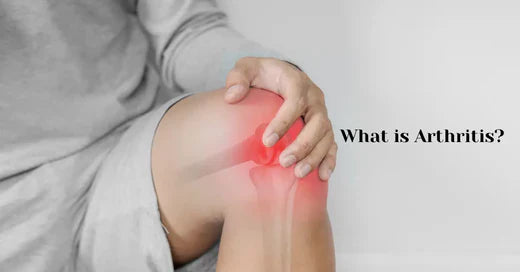
Understanding Arthritis: Symptoms, Causes, and Different Types
Share
Arthritis refers to a group of conditions that attack your joints, the areas where two bones connect in your body. These connections can wear down naturally over time, especially as we age. Injuries and certain health problems can also contribute to arthritis development. This blog explains arthritis and explores its common symptoms, potential causes, and its various types.
Table of Contents
Common Symptoms of Arthritis
The symptoms of arthritis can affect any joint in the body, although some areas are more commonly affected. Here are the most common signs:
- Joint Pain: This is the most common symptom, ranging from a dull ache to a sharp, stabbing pain. It might be worse in the mornings, after periods of inactivity, or with certain activities.
- Stiffness: Sometimes your joints may feel stiff, particularly when you wake up or due to prolonged sitting. However, this stiffness often improves with movement.
- Swelling: Pain in your joints can cause them to appear swollen or puffy.
- Redness: In some cases, the skin around the joint may appear red and inflamed.
- Decreased movements: The ability to move the joint through its full range of motion may be limited due to pain and stiffness.
- Weakness: Muscles around the affected joint may feel weak, impacting your ability to perform daily activities.
- Grating or Popping Sounds: Creaking or popping sounds may be heard when moving the joint, particularly in osteoarthritis.
It's important to note that not everyone with arthritis experiences all these symptoms. The severity and type of symptoms can vary depending on the specific condition you have.
What Triggers Arthritis?
The causes of arthritis vary, and understanding the underlying reason behind your condition can guide your treatment. Here are some common causes:
- Wear and Tear (Osteoarthritis): The most common type of arthritis, osteoarthritis, results from the breakdown of cartilage, the cushioning material between your bones. This breakdown occurs naturally with age or due to previous injuries to the joints.
- Autoimmune Disorders (Rheumatoid Arthritis): In rheumatoid arthritis, the immune system mistakenly attacks the joint lining, leading to inflammation and damage.
- Infections: Certain bacterial or viral infections can invade joints, causing inflammatory arthritis like Staphylococcus aureus and more.
- Metabolic Issues: Conditions like gout, a buildup of uric acid crystals or increased levels of cholesterol in the joints, cause sudden and severe joint pain and inflammation.
- Genetics: Some types of arthritis, like psoriatic arthritis, have a genetic component, meaning you're more susceptible if it runs in your family.
- Lifestyle: Lifestyle factors like obesity, smoking, repetitive stress and reduced physical activities may also contribute to arthritis.

Different Types of Arthritis
There are over 100 types of arthritis that are said to exist. Here are a few of the common types:
- Osteoarthritis (OA): It is the most prevalent form, affecting the cartilage in your joints. It develops gradually, causing pain and stiffness in weight-bearing joints like knees and hips.
- Rheumatoid Arthritis (RA): This autoimmune disease causes inflammation in the joint lining, leading to pain, swelling, and sometimes joint deformation. It can affect multiple joints at the same time, often impacting the hands, wrists, and feet.
- Gout: This painful condition results from the accumulation of uric acid crystals in the joints, causing sudden and severe attacks of pain, redness, and swelling, most commonly affecting the big toe.
- Psoriatic Arthritis: This is associated with the skin condition psoriasis, and can affect people with psoriasis, causing inflammation and pain in the joints.
- Ankylosing Spondylitis: This type of arthritis primarily affects the spine, causing inflammation of the joints where the spine bones connect. It can lead to stiffness and pain in the lower back and buttocks, and in severe cases, can harm the spinal vertebrae.
Risk Factors for Developing Arthritis
While the exact causes of arthritis can vary depending on the type, several factors can increase your risk of developing the condition.
- Age is a significant risk factor, as the cartilage in your joints naturally wears down over time.
- Additionally, obesity puts extra stress on weight-bearing joints like knees and hips, accelerating cartilage breakdown and contributing to osteoarthritis.
- Previous joint injuries, repetitive stress from certain activities, and even genetics can play a role.
- Certain medical conditions like gout, psoriasis, and lupus also raise the risk of developing specific types of arthritis.
If you have a family history of arthritis, maintaining a healthy weight, exercising regularly, and avoiding activities that strain your joints can significantly help in improving your arthritis.

The Prevalence of Arthritis in India
Arthritis is a widespread health concern in India, impacting millions of people across all age groups. Here's a closer look at the prevalence and some related facts:
- High Prevalence: Several studies estimate that around 23.46 million individuals in India had osteoarthritis (OA), the most common type, in 1990. This number significantly increased to 62.35 million by 2019.
- Beyond Age: While age is a major risk factor globally, arthritis in India is concerning because it affects a wider demographic compared to developed nations. This could be attributed to factors like obesity, a growing concern in India, and potential underdiagnosis in younger populations.
- Impact on Women: Research consistently shows a higher prevalence and severity of arthritis, particularly in women compared to men. This might be due to hormonal changes, differences in joint structure, and factors like carrying excess weight during pregnancy.
Takeaway
Arthritis is a chronic condition but it doesn’t have to hamper your daily life. By understanding the symptoms, potential causes, and different types of arthritis, you can be proactive in managing your health. Additionally, adopting a healthy lifestyle, seeking early diagnosis, and working collaboratively with your doctors can significantly improve your condition and maintain an active lifestyle despite it.
Frequently Asked Questions
Q: Are there any foods I should avoid if I have arthritis?
While there's no single arthritis diet, certain foods can worsen inflammation. Processed foods, sugary drinks, and unhealthy fats might contribute to inflammation. Conversely, focusing on a diet rich in fruits, vegetables, whole grains, and lean protein can be beneficial.
Q: Can exercise help with arthritis?
Absolutely! Regular exercise strengthens muscles around the joints, improves joint mobility, and reduces pain. Low-impact exercises like walking, swimming, or yoga are particularly beneficial for arthritis management.
Q. Can arthritis be cured?
Unfortunately, there's no cure for arthritis. However, with proper treatment and management strategies, you can effectively control symptoms and prevent further joint damage. This can significantly improve your quality of life and allow you to maintain an active lifestyle.
